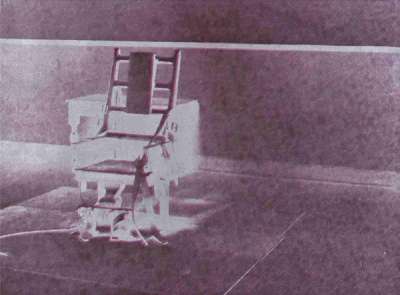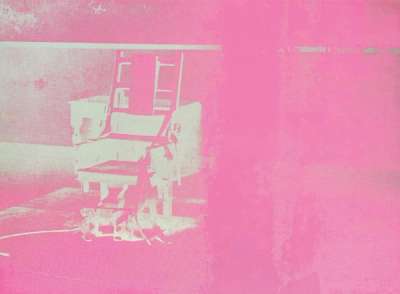
Electric Chair (F. & S. II.74)

Electric Chair (F. & S. II.74)
Signed Print
Andy Warhol
£11,500-£17,000Value
Indicator
$22,000-$35,000 Value Indicator
$20,000-$29,000 Value Indicator
¥100,000-¥150,000 Value Indicator
€13,500-€20,000 Value Indicator
$110,000-$170,000 Value Indicator
¥2,190,000-¥3,240,000 Value Indicator
$14,500-$21,000 Value Indicator
AAGR (5 years) This estimate blends recent public auction records with our own private sale data and network demand.
There aren't enough data points on this work for a comprehensive result. Please speak to a specialist by making an enquiry.
Medium: Screenprint
Edition size: 250
Year: 1971
Size: H 90cm x W 122cm
Signed: Yes
Format: Signed Print
TradingFloor
MyPortfolio
Your collection tracked in real time.
Build your portfolio, manage valuations, view return against your collection and watch works you're looking for.
Track auction value trend
Auction Results
| Auction Date | Auction House | Artwork | Hammer Price | Return to Seller | Buyer Paid |
|---|---|---|---|---|---|
| October 2022 | Christie's New York - United States | Electric Chair (F. & S. II.74) - Signed Print | |||
| October 2022 | Phillips New York - United States | Electric Chair (F. & S. II.74) - Signed Print | |||
| March 2022 | Christie's London - United Kingdom | Electric Chair (F. & S. II.74) - Signed Print | |||
| October 2017 | Bernaerts Auctioneers - Belgium | Electric Chair (F. & S. II.74) - Signed Print | |||
| March 2016 | Christie's New York - United States | Electric Chair (F. & S. II.74) - Signed Print | |||
| October 2015 | Phillips New York - United States | Electric Chair (F. & S. II.74) - Signed Print | |||
| October 2012 | Phillips New York - United States | Electric Chair (F. & S. II.74) - Signed Print |
Meaning & Analysis
Electric Chair (F. & S. II. 74) is one of a series of ten limited edition screen prints by Andy Warhol that make up the Electric Chair series (1971). The print shows a neon yellow photographic image of an unoccupied electric chair, rendered in his iconic two-tone screen print technique. Taken from a 1953 press photograph used to show the equipment used in the high-profile executions of Julius and Ethel Rosenberg at Sing Sing prison, this image first appeared in Warhol’s work in his Death and Disaster Series (1964). In Warhol’s iteration of the subject from 1971, the image is cropped so as to focus more on the chair itself, occupying a larger proportion of the composition and printed in bold colours.
Retaining the graininess and immediacy of the mass media image upon which Electric Chair (F. & S. II. 74) is based, Warhol also maintains an element of the handmade by creating imperfections and colour variations across the series. Warhol reproduces this sinister image repeatedly across the entire series to point to the way that mass media images work to desensitise the masses into accepting tragedy and death into their everyday lives.
Devoid of all human presence, Electric Chair (F. & S. II. 74) explicitly deals with the subject of death, enlarging and elevating it to the realm of high art so as to confront the viewer to relive the event. Playing on ideas of public spectacle, Warhol simultaneously repels and excites the viewer with this stark image.









